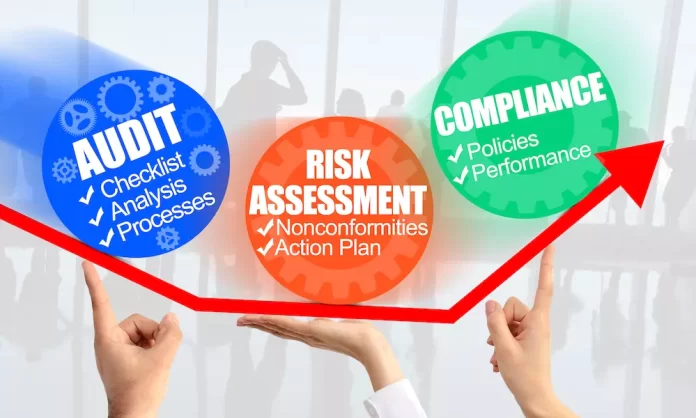A career in auditing is an excellent choice for today. Compliance is a major focus today, particularly in finance and technology.
Auditor: You are a key player in maintaining the integrity of business and financial markets by ensuring that financial data is accurate and transparent. Today, there are many different types of auditing jobs, not only in finance.
Auditors can help organizations avoid costly fines for non-compliance.
- Regulatory Compliance – adhering to accounting principles and industry regulations, which can prevent fraud and other financial irregularities
- Risk Management – identifying risks and weaknesses in a company’s internal controls and providing recommendations for improvement
- Investor Confidence – provides assurance to investors that a company’s financial statements are accurate and reliable
- Corporate Governance – providing independent oversight and accountability, auditors help ensure that companies operate transparently and responsibly
In this blog we will look at the roles of auditors and their key characteristics. We will also discuss the pros and con of the role.
The Pros and Cons of Auditing
Pros
Job security
Redundancy is a common occurrence in today’s world. Auditors are in high demand because auditing is important for all businesses. As a result, auditors are relatively safe in their jobs. They are less likely to lose their jobs or be unemployed.
There are other areas such as Cryptocurrency Security Standard Auditors in this field are unlikely to be unemployed long.
Professional growth
Through training, education and experience, auditors can enhance and develop their professional skills. They can specialize, for example, in IT, financial, or environmental auditing.
Career advancement
Auditors with experience can move up to positions like audit manager, senior management, and partner within accounting firms. Other roles such as internal audit, risk management or financial reporting are available. Auditor with extensive experience may choose to freelance, whether with an LLC, or work alone, in order to control their working hours, work, and pay.
You can also find out more about Cons
Long working hours, tight deadlines
Auditor’s work can be very stressful, especially when auditing is at its peak. The process of compliance can be longer when a business or client is not prepared.
Auditors may be asked to accomplish the impossible as quickly as possible. This can result in long hours of work to shorten the time it takes the business to comply with the requirements.
Repetitive work
Auditors know that the work they do is tedious and repetitive, especially when it comes to routine audits. It is therefore important to keep the role fresh by moving into new fields of expertise.
High levels of Responsibility
Auditors have a great deal of responsibility as their work has a significant impact on the companies that they audit. To accurately identify issues and risks, they must be very thorough in their work.
Key traits of an auditor who is successful
What soft skills or traits are required for auditors to be successful?
To perform the job effectively, auditing requires both technical and soft skills. Auditors should have soft skills such as communication, attention, and time-management to be able to successfully perform their jobs.
Communication skills
Auditors need to communicate effectively at the level of their clients, team members and stakeholders, in their own language. For example, auditors must communicate complex information concisely and clearly so there are no misunderstandings about what’s required to pass the audit.
Analytical skills
Auditors need strong analytical skills in order to evaluate financial information, identify trends, anomalies and internal controls.
Attention to detail. Auditors should be meticulous when they work, and pay close and careful attention to small details to find errors and discrepancies.
Time management
Auditors are often required to meet tight deadlines, so they must be able to manage their time well to complete their work.
Independence and objectivity
To ensure their findings are credible and unbiased, auditors must maintain a high level of independence and objectivity.
Adaptability: Auditors need to be able to adapt and work in unfamiliar and new environments.
Professionalism
To maintain credibility and trust with clients and stakeholders, auditors must demonstrate professionalism and ethics in all aspects their work.
Teamwork
Auditors work in teams often and must therefore have excellent teamwork skills.
Types of Auditors
Today, there are many types of auditing roles available in the business world.
External auditor
External auditors are independent auditors who are not employed by the audited company. They are usually hired by the board of directors, shareholders or senior management in order to give an unbiased opinion about financial statements.
The discipline of an auditor may not necessarily be accounting or finance. You might engage an external auditor, for example, to evaluate your compliance with Cryptocurrency Security Standard.
Internal auditor
The primary role of an internal auditor The purpose of this is to assure the management that processes and procedures within an organization are operating effectively and efficiently. It involves assessing the organization’s risk management practices and its internal controls, to make sure they are effective at mitigating any risks.
They can also provide suggestions for improving the organization’s controls and processes. They can also work with outside auditors to make sure that financial statements of the organization are accurate and conform with accounting standards.
Internal auditors can play a crucial role in helping companies achieve their goals by ensuring they have the right processes and controls for managing risks and maintaining compliance with laws and regulations.
Government auditor
Government auditors are employed by government agencies, such as Internal Revenue Service (IRS), in order to audit companies and individuals. compliance Tax laws and regulations. An expert in another area, such as IT auditing or performance management auditing, may also be a government auditor. IT auditing and performance management auditing.
Forensic auditor
The forensic auditor specializes in financial fraud, embezzlement and other financial crimes. Also called forensic accountants Often, we work with attorneys and law enforcement agencies.
Information Technology (IT) auditor
IT auditors are auditors who specialize in assessing the effectiveness of IT systems, controls and security. This includes data integrity and privacy. Auditor’s can choose from different technologies, including apps and systems. PCI DSSClient-server networks, and much more.
Environmental auditor
Environmental auditors are auditors who specialize in evaluating the environmental compliance of a company and its sustainability practices.
Social compliance auditor
Social compliance auditors are auditors who specialize in evaluating the compliance of a company with social standards. social responsibility The laws and regulations governing labor, including those relating to human rights and conditions of employment.





























